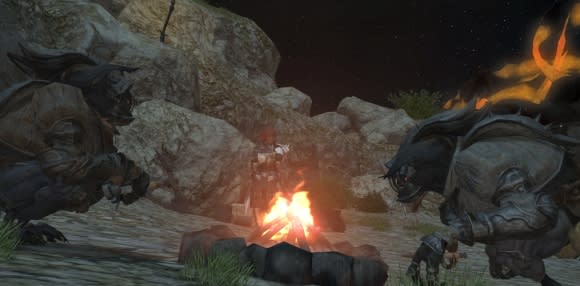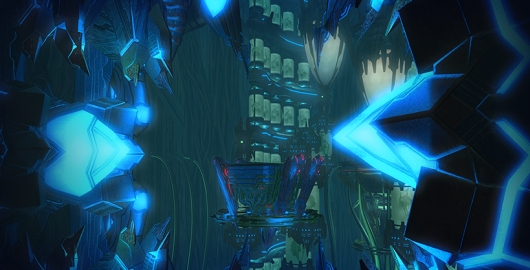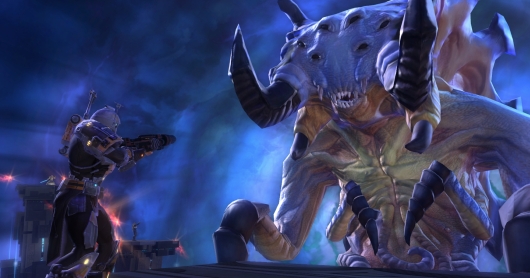The Soapbox: Six reasons MMOs should abandon raiding, part 3
In parts one and two of this Soapbox miniseries, I tackled four of the reasons the MMO genre should abandon raiding as a central gameplay element, but one key argument has been left out until now: The social aspect of raiding.
Whatever else is true of raiding, it is definitely social. Communities spring up and keep going largely based on that raiding community, to the point that it's easy to assume that everyone in a game's population raids. There are lengthy discussions about raiding, about how to raid, about tips and tricks for clearing raids. The social aspect of raids is what I think has kept them around so long; it's easy for a designer to look at that sort of engagement and see it as vital.
Yet there's more to the story than might be available at a glance, and the social aspect is not without steep costs. Those social elements do not carry the weight of everything else... mostly because they aren't as strong as they appear.

Raiding pigeonholes social interactions
When I was in sixth grade, my friends all played Magic: the Gathering along with me, and there was a gentleman's agreement among all of us: The game isn't fun unless everyone gets to play. We didn't pay close attention to official news about card legality, but we did pay a lot of attention to house rules that said things like it's really not cool to play Shatterstorm against someone's all-artifact deck. Sure, it works, and that all-artifact deck is kind of terrible anyway, but you know that some people just like to build weird decks. What did it matter who won? It's more fun to play.
There are people who love games but are terrible at them. I know some people who are fabulous to talk with, dedicated players, wonderful roleplayers, and kind of terrible at the game in question. And at the core of raiding is a choice: a choice between those friends and clearing a raid.
I'm not saying that glibly. During my more intense raiding days, I had to actually sit down and discuss whether or not a given player was holding our clear attempts back. That's a fine discussion to have if you're going for world firsts or something ultra-competitive, but it throws priorities into stark relief when your primary goal is to have fun with your friends. It's not fun to gauge your friends based on how capable they are at a game.
MMOs are social games, but there are lots of ways to have social interaction, and somehow some players have gotten the idea in their heads that social just means "huge groups to clear endgame content." That is a social interaction, but it's hardly the only interaction. Competing over auction house prices. Chatting. Doing smaller group content. Bumping into people while you're both solo. PvP. Seeing events unfold due to the actions of another player. Theoretically, we have loads of options.
Raiding doesn't care about any of that. If you're looking to put a raid group together, you're looking to put people together who can actually clear the content. Liking people is secondary. I'm not talking about actively disliking people by necessity; I'm talking about averaging issues together and saying, "Yeah, Michael isn't as good as Sandra. I don't know either of them very well, but Sandra's a beast of a tank and Michael's just another DPS with impulse control issues."
That's not just damaging to Michael's ego; it's damaging to the overall social fabric of the games. And by extension...
Raiding is only there because it's assumed to be a necessity (while ignoring dramatic conventions)
From a fiction standpoint, raids are literally the most boring parts of any conflict. No story ends with the hero gathering up a damn army and then facing the primary antagonist with said army still right at his back. It comes down to individuals facing off as individuals, a contest of wills. We want to see the hero of an action film kick the villain into a spinning fan, not see the hero show up with two dozen other people and beat on a lone dude for half an hour.
Star Wars: The Old Republic half figured this out. After all, the personal story -- i.e., the biggest reason for most people to play the game -- doesn't require your going into even one single grouped instance. But what did the endgame involve? Raids. More raids. That was the core of the endgame, and once you'd gone through it once, the only thing that awaited you was the same endgame that you'd left behind in the last game.
The assumption, for years, has been that raids are a necessity because World of Warcraft had them. That all games have to have them. Except there are games that don't have them that do fine for themselves. Guild Wars 2 has its endgame issues, but its lack of raids hasn't hurt it in the market. Star Trek Online has some big group queues, but nothing requiring the exacting progress standard of high-end group content seen in other titles. Final Fantasy XIV designs its progression content with eight people in mind, and it's not the whole and breadth of the endgame so much as one option among many (and those other options get constant attention and expansion).

When you realize that they're not, in fact, necessary, and when you start realizing all that raiding takes away from MMOs, you have to start wondering why they're there at all. Raids as a staple in MMOs are, ultimately, just like open PvP: They were something that seemed necessary for a while, something some people liked and a lot of others disliked... and they ultimately are holding the genre back. They are a model being shoehorned in where it doesn't fit. They're resource hogs. They're archaic.
The most popular game out there has them. But Ultima Online was popular in its day despite its open PvP, too. The question is whether that game is popular because of its raiding or in spite of it, and how much of the game manages to keep pulling players along through sheer social inertia.
Games should most definitely have challenging content. They should offer the option of taking on big group content, sure. But assuming that the two have to coexist in the same space and make up the entirety of the top-end game isn't just absurd but actively damaging. Raiding in that traditional model costs too much in every aspect for too little benefit, and it ultimately serves as a holdover that isn't doing any favors for the genre as a whole.
And yes, I honestly believe that this is a foregone conclusion. I think in another decade we'll look back at the idea of endgame raiding as the de facto focus of games and wonder how that even happened. (And we may very well laugh at the idea of MMOs as a distinct genre, but that's a forecast I'm not ready to make.) The fact that it's stuck around for so long makes it seem to be helpful, but it's becoming more and more obvious how little it brings to the table for all that it demands.
That's what it all comes down to. Raiding as the ultimate destination of endgame is more trouble than it's worth. It's time to drop it.
Don't miss Eliot's whole Soapbox miniseries on raiding:
The Soapbox: Six reasons MMOs should abandon raiding, part 1 | |
The Soapbox: Six reasons MMOs should abandon raiding, part 2 | |
The Soapbox: Six reasons MMOs should abandon raiding, part 3 |

Everyone has opinions, and The Soapbox is how we indulge ours. Join the Massively writers as we take turns atop our very own soapbox to deliver unfettered editorials a bit outside our normal purviews (and not necessarily shared across the staff). Think we're spot on -- or out of our minds? Let us know in the comments!





